The library of things: could borrowing everything from drills to disco balls cut waste and save money?
Never mind books: in a slightly tatty block in Oxford you can borrow all the things that usually cost a fortune to hire – and its advocates say it’s a scheme that is about to conquer the world
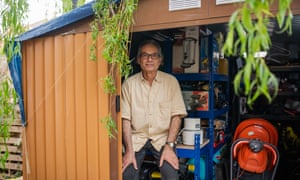
Aristotle House in Oxford is not as grand as it sounds. A commercial block built by the canal in the 1960s, it is no longer fit for paying tenants, so its owner, Wadham College, allows a group of social enterprises to stay there, like official squatters. And there’s evidence of their enterprise everywhere outside, from the drop-box for returning poetry books, to the compost heaps built from old pallets, and the young Victoria plum tree blossoming in a pot by the door. Inside, for those who know about it, is the Oxford library of things. It sounds like the setting for a Philip Pullman novel, and represents a vision of humanity that’s nearly as fantastical – an idea so simple and so brilliant that, the first time you hear it, you wonder why it hasn’t conquered the world already. Then you wonder if it’s just about to.
Imagine you have a grimy old picnic table that needs sanding after a winter in the garden. Or you want to host a Eurovision party, but your TV is too small for everyone to see. Commercially renting a belt sander for the weekend costs about £40, and a projector much more, so unless you’re on good terms with a well-equipped neighbour, you either spend money on a device you will hardly use, or you give up. But what if someone volunteered to be that neighbour, as people now have in Frome, Crystal Palace, Stirling, Edinburgh, Totnes, Oxford and in growing numbers around the world? If they could just gather a collection of extremely, but only occasionally, useful items, and find a place to keep them, there would be no need for everyone else to buy their own. Even paying a small fee to cover costs, we would save money, and space in our homes, and the benefits to the environment in waste prevented would be enormous. Indeed, as you browse for Oxford’s belt sander (£8 a week) and projector (£10 a night), you might decide, while you’re at it, to borrow a pressure washer for the patio (£10 a day), and add a disco ball (£5 a week) and chocolate fountain (ditto) for the party. You’ll live a cheaper, cleaner, more enjoyable and more sustainable life.
Oxford’s library of things – or Lot, as many in the movement call them – was the last of the 16 groups to get a piece of Aristotle House. It’s not a large piece; in most buildings it might make a generous broom cupboard, or a mean spare bedroom. Yet somehow, the Lot founder, Maurice Herson, with only donated shelves and boxes, has managed to store the library’s growing inventory here. With its ice-cream maker and unicycle and telescope mixed in with its drills and ladders and saws, it looks like the home of a hoarder who is just about on top of things. “It is a sliver,” Herson says, “but I get better and better at packing stuff in.”
Herson is 69, two years retired from editing a magazine about refugees, before which he worked in emergency aid overseas. Leading the Lot has been his chief concern since he set it up last June, together with Alexandra Mates, who works in waste management for the council and also runs repair cafes. To begin with they were just a Facebook group and a plan. Then 12 people came to their first meeting in September, since when they have grown to 16 volunteers, each with different skills to offer. Some work on the website, some rustle up donations and some run the Lot’s social media, to Herson’s great pleasure and relief. “We’re a community group,” he says. “The idea is that people should be involved.” The official launch was February, with any money they generate going back into the project.
In essence they have a simple task. Gather a good inventory (350 items so far), build a system to manage membership and online bookings (a free software package, initially, called myTurn), then staff the Lot on Tuesday and Thursday evenings, and Saturday afternoons, for collections and returns. When we sit down for herbal tea beside a row of someone’s seedlings, however, Herson makes it clear there is more to it than just a cupboard and a website. Gathering donations, for example, was not the problem; the problem was gathering too much – especially lawnmowers, for some reason. “One of the things I learned was how to refuse things,” Herson says, “because at first I was crap at it.”
And space is tight, even without six lawnmowers, which means you have to store things where they will fit, not in a way that makes thematic sense – which in turn means you need a very good system for recording where things are, and you need another place to store the donations that haven’t been added to the system yet. “This morning I spent an hour just moving stuff around,” Herson says.
Then there are the times people lose or break things. One young man recently returned without a hacksaw because, he said, the police had confiscated it. (Herson tried but failed to retrieve it from the station.) And, of course, to find out when things are broken, you need to test them when they come back, right down to checking the board games for missing pieces. “Jigsaws are worse,” Herson sighs. Add it all up, including emails in the evening, and he guesses that he works about 30 hours a week, for free.
Listening to all this, you begin to understand why Lots have been an exciting new idea for such a long time. Toy libraries, of course, have thrived since at least the Great Depression; and a handful of tool libraries, as they mainly were, began to appear in the US during the second world war. In the autumn of 1943, the rotary club of Grosse Pointe, Michigan, established a collection it hoped would improve dexterity in the local youth and ease the scarcity of tools in wartime. It continues to be used, as part of the Grosse Pointe public library, to this day.
There was a greater flourishing in the 1970s, when tool libraries opened in, among other places, Cohoes, New York (1970); Columbus, Ohio (1976); and Berkeley, California (1979). However, it is a sign of how disjointed the movement was in those days that all three are sometimes said to have been the first. The Columbus and Berkeley tool libraries are still going. “There’s got to be a spirit of it somehow,” said Peter McElligot, the Vietnam refusenik who ran Berkeley’s, during an interview in 2008. “It almost becomes like a cafe or a bar or something.” These early tool libraries were often free for local residents, which helped, but as a consequence they often had to win arguments for funding. In truth, the Lot movement has hardly been a movement until the past 10 years.
It’s possible that the financial crisis helped, ironically, by making people poorer and more thrifty. “But in some ways,” says the tech entrepreneur Gene Homicki, “they became victims of their own success.” Homicki is a cofounder of the West Seattle tool library, and of myTurn, which was a small side-project a decade ago, but now provides a platform to more than 400 Lots in North America, Germany, the Netherlands, the UK, Australia, Ghana, China and elsewhere. The problem, as he sees it, was always a matter of scale. “As they became more popular there were more items to manage, more people to manage,” he says, “and the technology to make that really efficient didn’t exist.”
Homicki would say this, of course, but he isn’t the only one who does, and we’ve seen administration software make an explosive difference in other parts of the sharing economy. After all, in theory there was nothing stopping anyone from doing AirBnB or Uber in the 1970s, using printed catalogues and payphones. In practice, we can now see that those ideas were waiting for the internet. Besides, whatever is causing it, Homicki says the recent Lot explosion has been crazy: “It’s not just in a few communities doing it for the environmental impact,” he says. “It’s all of society, with governments getting on board as well. We’re starting to see growth in Europe that’s even faster than in the States and Canada.” He mentions universities beginning to offer Lots as a service to students, and big companies such as Stanley Black & Decker providing an inventory that staff can borrow from, for free. Homicki says he has even heard of LoT space being designed into new apartment buildings, although he can’t yet share the details. Altogether, myTurn has grown 234% in the first quarter of 2019, compared with the same period last year.
A cofounder of the Vancouver tool library, Chris Diplock, believes a new attitude is on the way, which will make access to a Lot seem natural in a decade or so. “Like, why do we have public pools?” he says. “We didn’t always have public pools. Why do we have public tennis courts? There was this moment when we just decided as a society that this was public infrastructure.” Homicki also talks about a change of mindset that happens quite rapidly once people can actually browse their local inventory, and see the items that are cheaply available nearby.
Still, if this is destined to happen, it might happen in a number of ways. Streetbank.com does away with a central library, and instead matches people with things to lend to others who need to borrow them. It now has more than 20,000 “neighbours” registered, offering to share more than 117,000 things. In the past year, Diplock has also launched an unusual contribution to the movement, which he calls the Thingery. Essentially, you take an empty shipping container, decorate it nicely, and place it in the middle of a community, filled with useful things. Members book items online, then access the container themselves, using a code. Once inside, they scan what they need. Each Thingery is thus self-service and can stay open from 7am to 9pm every day. It is managed now and then by staff, who also make seasonal adjustments, such as adding a gardening wall in time for summer. If you’ve used an on-street car club such as Zipcar, you’ll get the idea. So far there are three Thingeries in Vancouver and plans to expand if all goes well. “I’m definitely an optimist about this,” Diplock says.
When Herson and I emerge from his cupboard, Raquel, a new volunteer, has just arrived. She’s interested in the sharing economy. “I found it on Facebook, and I just came down,” she says. The Oxford Lot has been quite quiet since the launch, which is to be expected during the cold months, and before it has had a chance to generate much word-of-mouth. The laminator and the carpet cleaner have been popular, however, and over time Herson expects that they will adapt their range to meet the demands of their area. Nor are he and the other Oxford volunteers the only optimists: he recently received a group of visitors from Leicester, with plans to set up an Lot in their own city. “The idea is proliferating,” Herson says. “It’s beginning to happen. We’re at a relatively early stage of what might become a commonplace thing.”
Indeed, at some point during my tour he must have missed a booking, because now another woman arrives to collect her order. “Oh,” Herson says, checking his laptop. “This came in since I last looked!” The woman, Lydia, has reserved quite a large amount, including a carpenter’s jigsaw, several power drills and bits, a spirit level, a crowbar and a few other items, with which she plans to make pallet furniture for a music festival. Herson adds all the rental fees together. Then he says: “That comes to £16.40.” Not bad.
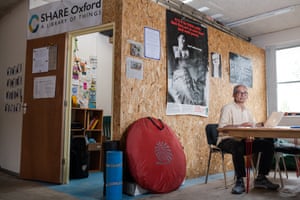
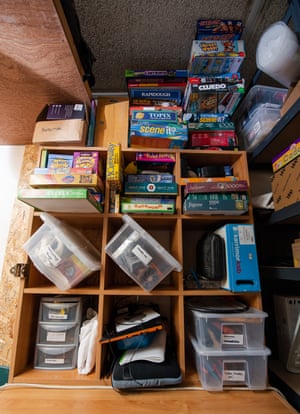
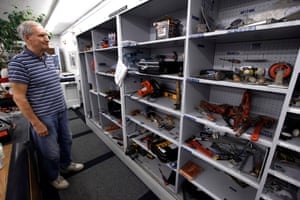
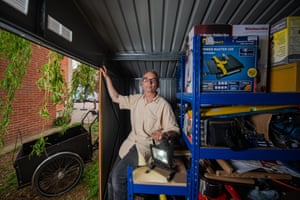
沒有留言:
張貼留言